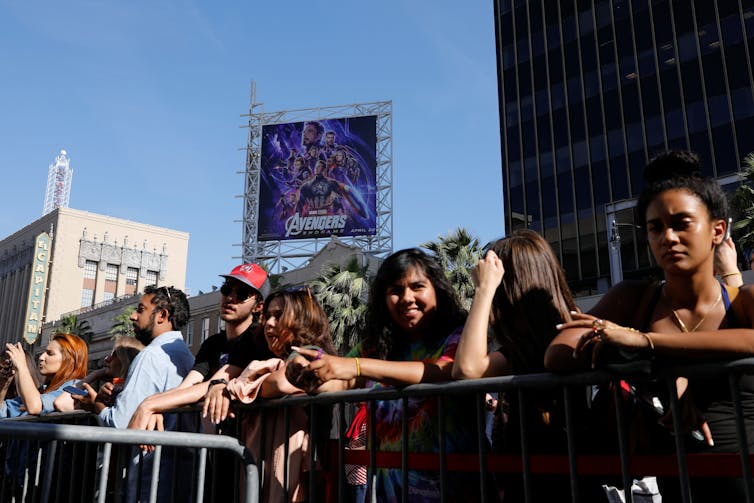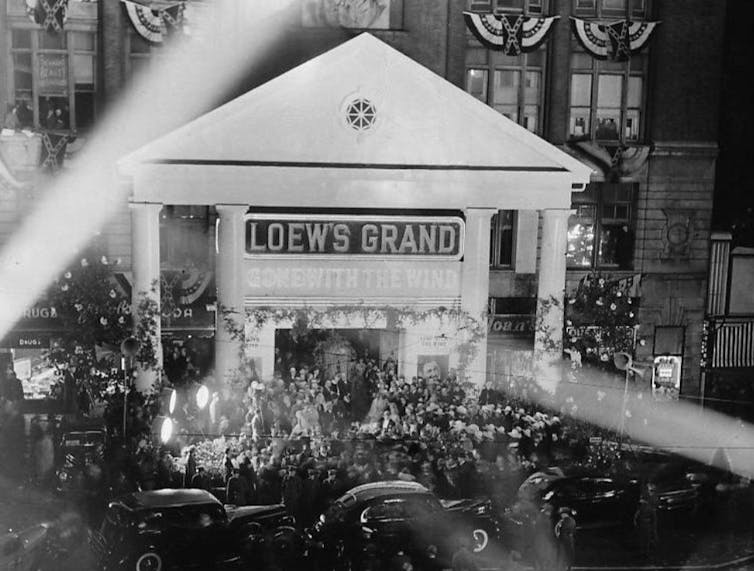Thanks, 'Avengers: Endgame,' for reminding us why inflation matters
- Written by Jay L. Zagorsky, Senior lecturer, Boston University
Marvel recently re-released[1] the final film in its “Avengers” series with extra footage and a post-credit tribute in hopes of breaking the worldwide record for top-grossing movie of all time.
So far, the gambit seems to have failed[2]. As of July 2, “Avengers: Endgame[3]” had collected US$2.77 billion in worldwide ticket sales[4]. This is still $22 million shy[5] of James Cameron’s 2009 film “Avatar.”
But in reality, “Endgame” isn’t even close to the real record-holder – nor is, for that matter, “Avatar.” The reason why gives me an excuse[6] to offer a short lesson on inflation.
 Fans line up to watch ‘Avengers: Endgame.’
Reuters/Mike Blake[7]
Fans line up to watch ‘Avengers: Endgame.’
Reuters/Mike Blake[7]
Why adjust for inflation
Prices from year to year cannot be directly compared with one another because the cost to buy things changes dramatically over time.
For example, in nominal terms, it costs more today to buy movie tickets, popcorn and soda[8] and get to the theater than it did in the past, while it costs much less to call[9] your friends and invite them to come along.
Without adjusting for inflation[10] and changes in purchasing power, comparisons from one time period to another are meaningless.
One of my grandfather’s favorite stories helps illustrate this. He used to talk about the “good old days” in the 1940s when a cup of coffee or a loaf of bread cost just 10 cents. But my grandpa didn’t consider how much lower his wages were back then.
Adjusting for inflation[11] means a 10-cent cup of coffee in 1940 would cost about $1.84 in 2019 dollars. Today you can buy coffee at chains like 7-Eleven[12] for a lot less.
The real box office king
And that’s why “Avengers: Endgame” is a long way from becoming the box office king. The heralded numbers don’t reflect inflation.
To demonstrate, let’s first look just at U.S. domestic ticket sales since it’s easier to calculate and see the effect.
The current list of top-grossing films[13] at the U.S. box office is led by “Star Wars: The Force Awakens[14],” which came out in 2015 and earned a nominal $936 million, followed by “Endgame” at $841 million and “Avatar” at $761 million.
Adjusting for inflation alters the list dramatically[15]. Box Office Mojo, an online box-office reporting service operated by IMDb[16], calculates inflation by multiplying average ticket prices[17] in a given year by estimated admissions.
As a result, “Endgame” drops to 17th place. “Avatar” slips to 15th with $877 million in adjusted ticket sales. “Gone with the Wind[18],” released in 1939, meanwhile, vaults to first place with $1.8 billion in adjusted ticket sales.
Calculating sales internationally is trickier because inflation is different in every country. IMDb, however, makes a valiant effort[19] making these adjustments.
Based on its estimates, “Gone with the Wind” is the worldwide box office leader with $3.4 billion to $3.8 billion in global sales. Cameron’s “Titanic” comes next at $3.2 billion to $3.4 billion, followed by “Avatar” with $3.2 billion.
With $2.77 billion, “Endgame” falls to fifth, leaving it with almost $1 billion in ticket sales to go to before it could legitimately lay claim to the top title.
 ‘Gone with the Wind’ came out in 1939, when ticket prices were less than 25 cents.
ACME News Photos, CC BY[20][21]
‘Gone with the Wind’ came out in 1939, when ticket prices were less than 25 cents.
ACME News Photos, CC BY[20][21]
Don’t believe the hype
We love Hollywood movies because they provide entertainment and escapism.
However, the marketing of Hollywood movies and the hype surrounding ticket sales records, like movies themselves, often play fast and loose with economic reality. This is something I expect we’ll see more of as films get released on far more screens and more people in countries like China[22] go to see them.
I liked “Avengers: Endgame,” whose plot is based on time-traveling superheroes. It was definitely three hours of escapist fun. But the hype surrounding its box office records, like its plot, shouldn’t be taken too seriously.
References
- ^ recently re-released (www.buzzfeed.com)
- ^ seems to have failed (www.hollywoodreporter.com)
- ^ Avengers: Endgame (www.marvel.com)
- ^ collected US$2.77 billion in worldwide ticket sales (www.boxofficemojo.com)
- ^ $22 million shy (www.boxofficemojo.com)
- ^ me an excuse (papers.ssrn.com)
- ^ Reuters/Mike Blake (pictures.reuters.com)
- ^ to buy movie tickets, popcorn and soda (www.foxnews.com)
- ^ costs much less to call (theconversation.com)
- ^ adjusting for inflation (www.bls.gov)
- ^ Adjusting for inflation (www.bls.gov)
- ^ coffee at chains like 7-Eleven (www.wegotcoffee.com)
- ^ list of top-grossing films (www.boxofficemojo.com)
- ^ Star Wars: The Force Awakens (www.starwars.com)
- ^ list dramatically (www.boxofficemojo.com)
- ^ IMDb (www.imdb.com)
- ^ average ticket prices (www.mpaa.org)
- ^ Gone with the Wind (www.rottentomatoes.com)
- ^ makes a valiant effort (www.imdb.com)
- ^ ACME News Photos (en.wikipedia.org)
- ^ CC BY (creativecommons.org)
- ^ more people in countries like China (www.hollywoodreporter.com)
Authors: Jay L. Zagorsky, Senior lecturer, Boston University
Read more http://theconversation.com/thanks-avengers-endgame-for-reminding-us-why-inflation-matters-119735

